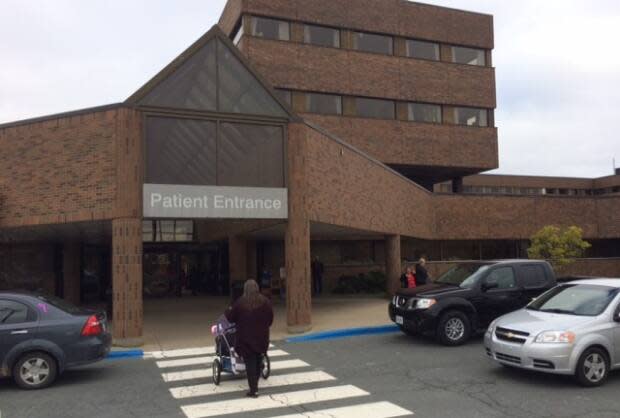Health-care contract promises U.S. company millions if it can make cuts in N.L. system

Newfoundland and Labrador's four health authorities have signed a deal with a U.S.-based health-care company that promises financial incentives — totalling tens of millions of dollars — if it cuts costs at hospitals and long-term care homes across the province.
The contract puts the Change Healthcare Canada — its Canadian headquarters are in British Columbia — in charge of building software that involves health-care scheduling and collaborating with the health authorities on "improved operational efficiency and anticipated cost savings." Those savings could come from reducing staffing costs, overtime, sick time, payroll errors and time-keeping labour, the contract states.
The contract comes with a lucrative possibility: the more savings Change Healthcare helps find, the more money it makes, up to $35 million over the course of the deal.
The provincial government, however, said the goal of the project is not to cut spending but to avoid staff burnout.
The contract came into effect in June with no public announcement before or after the deal was done — a signing that gave $3 million up front to Change Healthcare to begin months of preparation prior to the five-year operational side of the deal kicking in.
The contract's signatures include those of a Change Healthcare executive vice-president, the chief executive officers of Eastern, Central, Western and Labrador-Grenfell Health, and the CEO of the Newfoundland and Labrador Centre for Health Information, an entity that oversees the province's health-care information system and electronic records.
The deal also states the health authorities will cover sales tax and fees for any work Change Healthcare does beyond the contract's original scope. The authorities will also have to pay up to $5 million in penalties if they don't achieve 95 per cent adoption of the program within the organizations.
Eastern Health, where the program will roll out first, did not respond to CBC's request for an interview or comment by deadline.
Fears of job cuts: union
The deal came as a surprise to at least one union, representing 3,000 health-care workers in the province, which learned about it months later.
Sherry Hillier, president of the Newfoundland and Labrador branch of the Canadian Union of Public Employees, attended a virtual meeting in the fall to discuss details of the deal with stakeholders.
"I was kinda like, 'Holy God, what is this all about?'" said Hillier.
The contract doesn't get into the fine details of where savings will be achieved, and how much, but in a slide presentation from October, Change Healthcare stated its software will anticipate peak demand in the system, and will "align staffing to demand" as well as "optimize staff effectiveness."

Hillier said she doesn't see how that can happen, as her members are stretched thin as it is. To her, the contract means job cuts, and she questions whether an algorithm can match up to the reality of people's day-to-day duties.
"My biggest fear is for our members out there. Our members are overworked right now, they're understaffed, and this system is only going to make the health-care system that much worse," Hillier said.
When the meeting ended, Hillier said, she "didn't leave with a good feeling about this company," and contacted CUPE counterparts across the country. In Manitoba, CUPE's experience with Change Healthcare was one of widespread job cuts, she said, leaving those still employed struggling to manage their workloads.
"It's actually made for a devastating workforce in a couple of the hospitals in Winnipeg that CUPE represents there. It's been bad times in Winnipeg just with this company, because of the cuts," she said.
A spokesperson for a government health agency in Manitoba, however, disagreed, saying the company's software has "improved patient flow" and reduced reliance on overtime staffing. "We strongly dispute the assertion that there were any 'job cuts' related to the implementation of this software," the spokesperson said in an email, "and have continued to actively recruit for CUPE support staff during this time."
According to its website, Change Healthcare is "focused on accelerating the transformation of the healthcare system through insight and innovation," and says it is one of the largest health-care networks in the United States.
Hillier questions the motives of Change Healthcare to make changes — "This corporation is actually in it for the money," she said — and asks why the health authorities could potentially give millions of dollars to an American company when the province is in dire financial straits.
After the story was published, and after Hillier originally spoke to CBC News, CUPE issued a media release late Tuesday afternoon stating it wanted the four health authorities to "cancel their deal" with Change Healthcare.
The union draws a connection from the contract to Ronan Seagrave, chief operating officer of Winnipeg Health Sciences Centre, who was on hand when the company's plan for N.L. was presented to stakeholders last fall.
Seagrave, according to the union's release, was a KPMG consultant working on a report for the Manitoba health care system.
"His health system transformation team made 'title changes' to hundreds of full-time jobs, converting the hours of work to part-time. At least 500 nurses received 'job deletion notices' that fall, along with more than 700 hospital support staff," reads CUPE NL's media release.
Unions were at the table from the 'get go': Haggie
Health Minister John Haggie said he is surprised to hear CUPE take issue with the contract.
"The unions were there from the get-go.… I don't understand where they are coming from," he told CBC News on Tuesday.
"You have a company that is incentivized to produce the best results because they share in our success. And I think over the term of the contract they get somewhere around 10 or 15 per cent of the value of the savings. The health authorities, the health-care system, the province keep the rest, if there are savings."
After Haggie's interview, CUPE said it was not informed that the contract had already been signed when members were invited to a presentation about it last fall.

Haggie said the project originated in 2016 and came out of discussions at the time with the Registered Nurses' Union. He said former president Debbie Forward was "enthusiastic" about the approach.
Haggie said the approach and contract may be new to the province, but Vancouver Coastal Health has used the approach and "their reports were very favourable."
"It's not new, it's simply just not paper-based, it's electronic. Where it stemmed from was from our desire to help avoid burnout among staff. So they're not being mandated back or they're not doing extra shifts and overtime, since you can match the needs for staff and the right mix and right numbers, with the number of patients, and the level of illness you see on the floor."
"All scheduling on health care and front lines is done on paper and this was a way of getting that all sorted out, so that it was electronic,and you could match the staffing in a two-week period to the expected demand on the unit."
CBC News asked the Registered Nurses' Union if, in fact, Forward did support the contract. A spokesperson said the union "did not see or have any input on a contract. What we have been doing is pushing for government to move to acuity-based staffing."
A statement from the union went on to say: "The current staffing model for nursing is not meeting the needs of patients and results in chronic understaffing, excessive overtime and burnout among registered nurses."
It also said the union supports "staffing based on the real time needs of patients, not the number of beds or allocated budget," and added its executive will be "monitoring the rollout of the new system and remain hopeful that it will improve workloads, better align staffing to meet patient needs, and improve scheduling and patient flow."
Haggie, meanwhile, challenged those who see this as a roundabout way of making cuts.
"They are mistaken," he said.
"The motivation behind this was to match better the needs of patients and meet them, also with the needs of our workforce. We have heard how hard people have worked during the pandemic, this tool will help make their life easier."
PCs, NDP slam the contract
Opposition House leader David Brazil says the financial incentives in the deal are a non-starter for him.
"I have a real problem with that. I would think the people in Newfoundland and Labrador would have a problem with that. And I would think the health-care professionals would first be asking, 'Why not engage with us?'" he told CBC News on Tuesday.
"Taking a company that looks at a software package to decide how we better access health care, and the particular needs, to me is not the best solution."
While the contract was part of a competitive public tender process, NDP Leader Alison Coffin asked why there has been no information about it, until now.
"If this was good news for our hospitals, clinics, and long-term care homes, you can bet the Liberals wouldn't have kept this a secret," said Coffin in a statement.
Dire need for savings
It's no secret Newfoundland and Labrador has a money problem.
With a net debt of $16 billion, the province is close to insolvency, and the prospect of cuts to many sectors looms as a distinct possibility. Health-care spending, comprising more than 37 per cent of the last provincial budget, is a target.
The economic task force was scheduled to deliver an interim report on Sunday with potential recommendations for change, before announcing on Saturday it would miss that deadline by up to six weeks.
Under those harsh realities — complicated further by the pandemic and the provincial election — Hillier said hiring Change Healthcare still isn't the right move.
While overtime and sick leave may be a spending issue, she said a larger problem is not having enough staff in the first place, particularly in long-term care, causing people to rack up overtime to get the job done. She said the province needs to instead train and hire more workers to drive overtime costs down.
"To increase the workload on our members is just crazy. It can't be done," she said.

She also said any cuts will have a clear impact on patients, causing service reductions and longer wait times. The deal hasn't been brought to union members' attention yet, she said, in part because it took six weeks after CUPE-NL found out about it to even get a copy of the contract to peruse.
With the contract signed months ago, the project is now well into the first of three phases. The goal is to begin implementing the plan by September, starting at the Health Sciences Centre in St. John's.
The program will then roll out through the rest of the health authorities' acute-care facilities, including hospitals and long-term care homes throughout the province, with the contract set to conclude in September 2026, with an option to renew the contract after that point.

